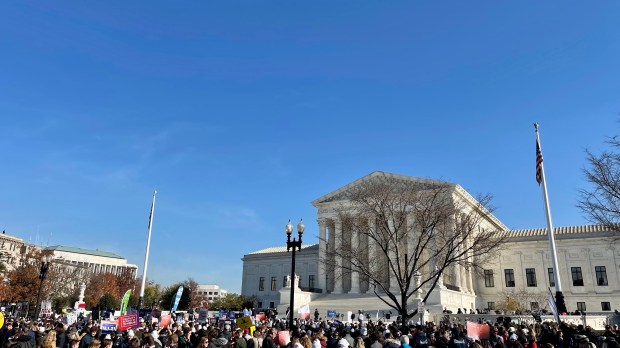As the State of Mississippi brought a case arguing that its 2018 law banning abortions after 15 weeks gestation is constitutional, thousands gathered in front of the Supreme Court in Washington, D.C..
The crowd represented a polity as divided as America. It seemed to me that pro-life demonstrators substantially outnumbered the pro-abortion faction.
Nearly 40 pro-life women spoke on the steps of the Court, participating in a rally organized by Mississippi Attorney General Lynn Fitch. Each speaker was more accomplished and inspiring than the next. These women told their stories and spoke of their work for justice for the unborn. They gave arguments from modern science, ethics, and deeply held religious convictions.
As these pro-life speakers took to the podium, abortion rights advocates swallowed abortifacient pills on the steps of the Court, to demonstrate their belief that the pills are safe and should be widely available.
A fiery contest
As I approached the Court wearing my Dominican habit, I was immediately accosted by abortion rights demonstrators. “Take your **** hands off my v*****!” one woman yelled. “Religious a***** like you need to stop telling women what to do with their bodies!” yelled another. The insults thrown were explicit and graphic. The raw anger on display was jarring.
I’ve served in the Northeast for years and I’m no stranger to slurs tossed around on the street. I’m sympathetic to the distrust and anger some have towards priests, owing to the shame of the American clergy’s recent past; I can understand the way people feel betrayed by the Church’s ministers and why they might respond viscerally when they see a priest.
And what’s more, I’m used to people saying that a priest has no business speaking about abortion. As a point of fact, the religious opposition to abortion is only part of the reason I’m pro-life, since robust and convincing scientific and philosophical arguments abound. But the abortion debate is often cast as a clash of believers versus nonbelievers … even if that is simply far from the truth. Whenever I’m accosted for “forcing my religious views” on women or on the abortion debate, I usually offer a faint smile, say a prayer, and move on.
But I can’t get over what I saw Wednesday or how many people spoke to me so aggressively. The whole event was so much more fraught than any political protest I’ve attended in the past.
As I gazed on the crowd of abortion rights advocates, I found myself asking: How could I tell these women that they’re loved? The words of the Gospel read at Mass that day haunted me. Jesus says to his disciples, “My heart is moved with pity for the crowd…” I heard the Lord’s words echoing in my heart. But what could I do to insist that there’s a better way? How could I say that a woman’s liberty and freedom and success and happiness don’t require abortion?
Compassion—the key
The crowd represented the American abortion debate, which seems intractable. There are two fixed sides with a chasm in between.
That said, it was the most hopeful I’ve been for the pro-life cause in years. There’s real reason to believe that the legal situation might substantially change as a result of Dobbs v. Jackson.
Which leads me to begin thinking about a world after Roe. What will we be known for? What’s the key to the pro-life movement from this point forward?
Reflecting on the life and committed pro-life view of Dorothy Day, Cardinal O’Connor of New York once wrote, “I have never condemned a woman who has had an abortion; I weep with her and ask her to remember Dorothy Day’s sorrow but to know always God’s loving mercy and forgiveness.” Our demonstration of mercy and compassion are the only way.
Pope Francis says, “To understand it well [the tragedy of abortion], one must be in a confessional.” The pope says that he counsels mothers to sing to their children, who are in heaven. Through these lullabies, these songs of love, a reconciliation can happen, a reconciliation between mother and child. The sacrament restores wounded souls to God, lullabies can join mothers to children.
A grand reconciliation is what we need. We have to fight for life, yes. But in the end, it is by the grace of God manifested through our compassion that minds and hearts will change.

